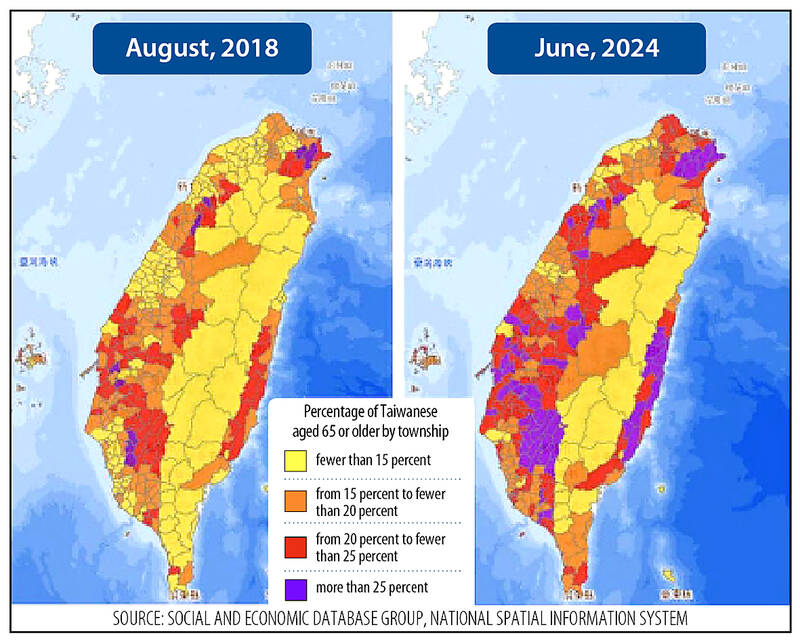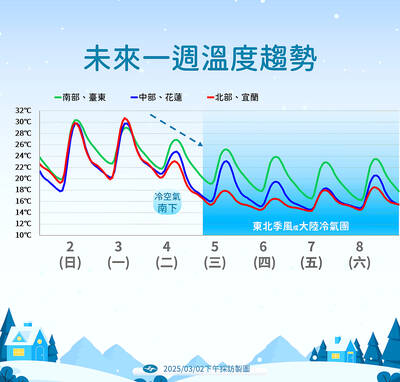Seven of the nation’s administrative regions, encompassing 57.2 percent of Taiwan’s townships and villages, became “super-aged societies” in June, the Ministry of the Interior said in its latest report.
A region is considered super-aged if 20 percent of the population is aged 65 or older.
The ministry report showed that Taiwan had 4,391,744 people aged 65 or older as of June, representing 18.76 percent of the total population and an increase of 1,024,425 people compared with August 2018.

In June, the nation’s elderly dependency ratio was 27.3 senior citizens per 100 working-aged people, an increase of 7.39 people over August 2018, it said.
That means there were about four working-aged Taiwanese for every person aged 65 or older who needed support, down from five last year, it said.
Chiayi County was the oldest region with 22.77 percent of its population aged 65 or older, followed by Taipei at 22.51 percent, Nantou County at 21.28 percent, Yunlin County at 20.85 percent, Keelung at 20.76 percent, Pingtung County at 20.54 percent and Hualien County at 20.2 percent, the report said.
Taipei and Keelung likely made the list due to the draw of better access to medical resources in the cities, the ministry said.
Hsinchu County, Hsinchu City, Lienchiang County and Taoyuan were the youngest regions with people older than 65 accounting for 14.25 percent, 15.06 percent, 15.4 percent and 15.48 percent of the local population respectively, it said.
The prevalence of young people in the jurisdictions — especially in Hsinchu county and city, home of the nation’s semiconductor industry — were likely linked to the high availability of jobs or other geographical factors, the ministry said.
Taiwan People’s Party Legislator Wu Chun-cheng (吳春城) last week introduced a bill urging the government to adjust its economic policy to account for the country’s aging population.
The bill, cosigned by legislators from across party lines, calls for replacing official language referring to “old age” and “senior citizens” with terms such as “the long-lived” and “of the strong generation.”
Taiwan is expected to lose 10 million people from its population in the next five decades to become the fastest-aging society in the world, Wu wrote in the bill’s statement of purpose, citing National Development Council data.
The nation must establish a basic law to address the aging crisis, as Japan did 30 years ago, he said, adding that Taiwan cannot afford inaction.
A Democratic Progressive Party lawmaker, speaking on the condition of anonymity, said that the bill’s proponents should provide a clearer definition for terms such as “the strong generation” before passing amendments.

SECURITY: The purpose for giving Hong Kong and Macau residents more lenient paths to permanent residency no longer applies due to China’s policies, a source said The government is considering removing an optional path to citizenship for residents from Hong Kong and Macau, and lengthening the terms for permanent residence eligibility, a source said yesterday. In a bid to prevent the Chinese Communist Party (CCP) from infiltrating Taiwan through immigration from Hong Kong and Macau, the government could amend immigration laws for residents of the territories who currently receive preferential treatment, an official familiar with the matter speaking on condition of anonymity said. The move was part of “national security-related legislative reform,” they added. Under the amendments, arrivals from the Chinese territories would have to reside in Taiwan for

CRITICAL MOVE: TSMC’s plan to invest another US$100 billion in US chipmaking would boost Taiwan’s competitive edge in the global market, the premier said The government would ensure that the most advanced chipmaking technology stays in Taiwan while assisting Taiwan Semiconductor Manufacturing Co (TSMC, 台積電) in investing overseas, the Presidential Office said yesterday. The statement follows a joint announcement by the world’s largest contract chipmaker and US President Donald Trump on Monday that TSMC would invest an additional US$100 billion over the next four years to expand its semiconductor manufacturing operations in the US, which would include construction of three new chip fabrication plants, two advanced packaging facilities, and a research and development center. The government knew about the deal in advance and would assist, Presidential

‘DANGEROUS GAME’: Legislative Yuan budget cuts have already become a point of discussion for Democrats and Republicans in Washington, Elbridge Colby said Taiwan’s fall to China “would be a disaster for American interests” and Taipei must raise defense spending to deter Beijing, US President Donald Trump’s pick to lead Pentagon policy, Elbridge Colby, said on Tuesday during his US Senate confirmation hearing. The nominee for US undersecretary of defense for policy told the Armed Services Committee that Washington needs to motivate Taiwan to avoid a conflict with China and that he is “profoundly disturbed” about its perceived reluctance to raise defense spending closer to 10 percent of GDP. Colby, a China hawk who also served in the Pentagon in Trump’s first team,

The arrival of a cold front tomorrow could plunge temperatures into the mid-teens, the Central Weather Administration (CWA) said. Temperatures yesterday rose to 28°C to 30°C in northern and eastern Taiwan, and 32°C to 33°C in central and southern Taiwan, CWA data showed. Similar but mostly cloudy weather is expected today, the CWA said. However, the arrival of a cold air mass tomorrow would cause a rapid drop in temperatures to 15°C cooler than the previous day’s highs. The cold front, which is expected to last through the weekend, would bring steady rainfall tomorrow, along with multiple waves of showers